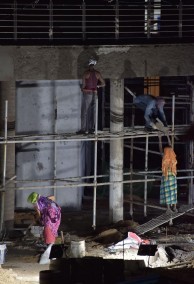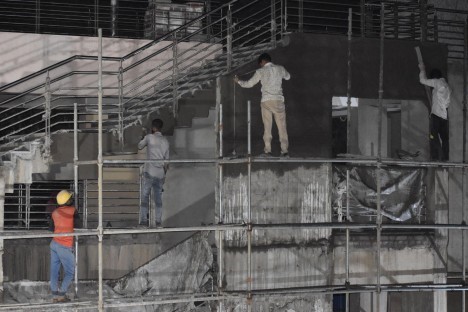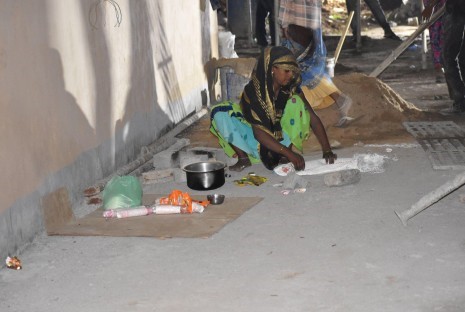A Tale of Two Lives: Construction Workers and Covid-19 at IIT Gandhinagar – The Story of Ram Pukar
The ravaging pandemic has wreaked havoc on human lives to the extent that normalcy appears to be a pipe-dream nowadays. Instead, getting used to the chaotic aftermaths of the pandemic has become the new normal around the globe through various means and mechanisms. To mitigate the adversities of Covid, people have been taking myriads of precautions to ensure their safety and security in a world that has unexpectedly come to a screeching halt.
Pic 1: Construction workers at IITGN
However, amid this enormous fiasco of confusion and disorder, some professionals are steadfast in their resolve in fighting through the pandemic for the greater societal cause. Frontline workers such as medical professionals and security workers take the most credit for their unwavering determination against every odd ensuing out of the pandemic.
Yet, people beyond these quintessential service providers probably receive the slightest acknowledgement for their efforts. There are blue-collar professionals like sanitation workers, construction workers, and privately owned local security guards who are barely appreciated for the work they have been putting through in this pandemic without a break, probably for the menial nature of their jobs. I will discuss one of these less valued professionals that I have been observing for quite some time at IIT Gandhinagar: A construction worker. Even amid the magnanimity of a deadly pandemic that knows no boundaries, the construction workers have constantly been withering the storm and performing their duties with such conviction that it is unprecedented, at least to my knowledge.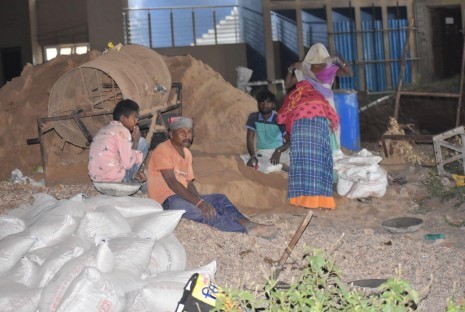
Pic 2: Construction workers taking rest, IIT Gandhinagar
The murky accounts of Ram Pukar, Pappu Kumar, Manoj Kumar, Yamuna Devi, and Raghubansh Chaubey are not just inspiring but worth taking lessons for. Nevertheless, in this blog, I will focus on the life story of an individual called Ram Pukar and his journey through a nerve-wracking reality (is ‘reality’ not supposed to be nerve-wracking after all?) of lessons, determination, and gratitude.
Pic 3: Pukar (Yellow helmet) with his fellow workers
Originally hailing from Bihar, Pukar was born and brought up in the Darbhanga district. He is the youngest among three brothers and a sister. Pukar grew up in poverty and affliction and often survived on a single meal per day. He dropped out of school after the eighth standard against his wish, as education in his village was considered a luxury back then. Pukar’s father was a rickshaw-puller, and his mother is a housewife. He lost his father due to a cardiac arrest when he was eleven years old and had to be involved in unskilled and “lowly” labour services along with his brothers to look after his family. At sixteen, Pukar became a bricklayer, earning fifteen rupees per day. As time passed, Pukar learned about the migratory labour services in other states across India with a comparatively higher wage scale than Bihar from his peers. Thus, he began his journey. Pukar’s first destination was Hyderabad at the age of eighteen as a construction worker under the dealership of Larsen and Toubro. After working there for four years, Pukar moved to Gujarat in search of a job. After drifting around like a vagabond for months, he finally managed to get a job as a construction worker that eventually landed him at IIT Gandhinagar.
Pic 4: Ram Pukar
“Probably the most drastic revelation of modern science is the struggle for existence. The conception of nature, “red in tooth and claw” in which life evolved slowly and painfully as the result of constant war among all living things- a war in which defeat meant death.”
— (Flügel, 1915, 518)
The aforementioned remark perfectly encapsulates Pukar’s life as a battleground for the survival of the fittest. Marred with doldrums and despair and devoid of adequate socioeconomic capital, Pukar’s life is also a continual struggle for existence where defeat necessarily means death. Yet, men and women like Pukar defy these odds in life regularly against tremendous torments. Not only Pukar’s journey through life is mind-boggling, but his struggle for existence and identity is awe-inspiring. As his fellow workers, working in a high-risk profession, that too during covid, is not easy, especially when work from home culture is growing exponentially to mitigate the spread of the virus. Inside the IIT Gandhinagar campus, vaccination was ensured for teachers, students, and non-teaching staff, and the online mode of interaction was catapulted to guarantee maximum security. Furthermore, the IIT Gandhinagar authority has been providing constant mental and physical care for those at the receiving end of the pandemic. However, for construction workers like Pukar, these measures of safety and care are far-fetched dreams as earning daily pennies to run the stomachs of him and his loved ones precedes everything. Having been forced to reside in the cramped temporary quarters outside the IITGandhinagar campus built by the respective construction company, Pukar’s life renders a pain-stricken chronicle of survival. With the absence of adequate water resources, proper drainage system, waste management facilities, and sanitation at his residence, Pukar’s life calls attention to the sordid actuality of a very different life: a life that is devoid of any semblance of humanity; a life that is a far cry from the life that we usually lead inside the campus. This tale of two lives is very common to our knowledge but often gets overlooked for supposedly being ‘trivial’.
As Pukar has been working under a contract with an imminent expiry date, his job is not guaranteed for the foreseeable future. He is under the impression that at some point in time, he will probably need to move out of Gujarat and go to some other place once his need and quota are over. Thus, Pukar always lives in the persistent fear of uncertainty, the fear of getting defeated in life. Nonetheless, he always refuses to give up and constantly motivates himself to drive further despite being bound by the restrictions of choice, profession, and education.
Pukar’s daily activities inside the campus as a construction worker are mundane. He collects bricks, transports them from one place to another with his fellow workmen and women, grinds cement with sand and water to prepare the gooey mixture that is used to construct the next hostel, the next mess, the next office building, the next classroom. He rarely gets breaks apart from the customary hiatus for breakfast and lunch. There are times when the work stretches to midnight with no possibility for a shift. Pukar also has limited forms of entertainment in his life. In the age of technology, where gadgets work as “extensions of man” (McLuhan, 1964) , Pukar can not afford a smartphone. His regular phone is typically used to make calls to his friends and family. From an outsider’s perspective, Pukar almost appears to be a robot who has been programmed to follow a specific routine day in and day out.
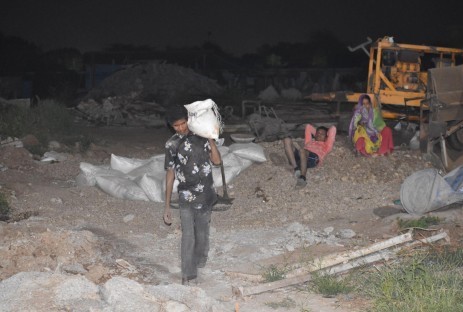 Pic 5: One of Pukar’s friends, Pappu Kumar, is carrying cement
Pic 5: One of Pukar’s friends, Pappu Kumar, is carrying cement
However, sitting down with him and having a conversation will shed a different light on his life. Notwithstanding the limited scope of his job and a meagre amount of salary, Pukar has hopes and dreams like everyone else. He does not hate his current position in life. Instead, he is blessed to have landed ‘somewhere’ that is helping him start a life from scratch. He hopes to continue his study and has already devised a plan to achieve his goal. Pukar first wishes to finish his matriculation exam and then plans to be enrolled in one of the Bachelor’s programs at an Open University. He loves History and wishes to pursue the subject in his further academic endeavours, if possible. One of the recent incidents of a security guard getting enrolled at Jawaharlal Nehru University in Russian Language programs, even under insurmountable challenges, inspired him to bits and pieces (Kalra, 2019). In addition, Pukar also wants to learn computers as one of his life-long dreams. He knows that conducting his studies concomitantly with his job as a construction worker is an arduous task. Nonetheless, getting out of his native state, meeting new people regularly, and mingling with other cultures and traditions provide him with the impetus to push forward. “We have only one life left. It is best to live through it, for it, and by it. I will try doing everything necessary to make this life worth living for my family and me,”- observed Pukar during one of our informal meetings.
Pic 6: A female worker of Pukar is cooking at the construction site
Pukar and I do not meet on a regular basis. I do not have his phone number either. Our initial meetings were spontaneous as I used to take strolls to witness the new buildings in the making. I stumbled across Pukar one fine evening as he was resting under a temporary shade after the day’s work. I broke the ice and initiated a conversation despite the fear of being rebuffed. However, an exhausted Pukar came across as energizing and lively as ever and engaged in the prolonged conversion with equal enthusiasm and passion. We met a few times after that and talked about life in general. Pukar expressed his admiration for the academic environment of the IIT. At the same time, he vented out his frustration over the everyday anguish of a plethora of men and women who are on the verge of losing their human identity at the expense of an assiduous and unnerving job like construction work, where the mortality rate is one of the highest among all professions in India (Olazába, 2019). Some wayfare families come with their children from the Basan and Palaj villages. Sometimes, they cook and reside at the construction sites only. Completely detached from a normal childhood, their kids roam around the campus.
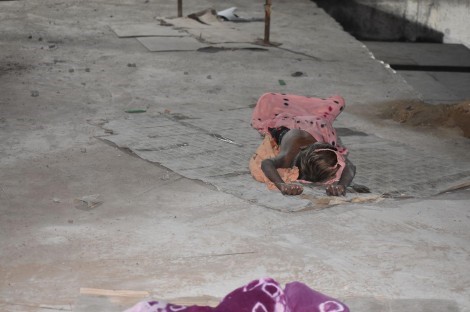 Pic 7: A child of one of the workers is sleeping at the construction site
Pic 7: A child of one of the workers is sleeping at the construction site
As a student, being bogged down in the ceaseless academic pressure in a competitive environment often gets on my nerves. Oftentimes, the constant apprehension of not being able to live up to my potential is too much to deal with. My meeting with Pukar is an eye-opener for me in this regard. I use Pukar’s journey through obdurate realities as a lesson to drive myself forward when I am down with anxiety and hopelessness in personal and professional undertakings. As a man whose life is under continuous trials and tribulations, Pukar appears as a defiant source of hope amidst the perpetual morbidity of life. Being humane to another human and taking inspiration from him/her does not take anything away from us; rather leaves indelible marks on our lives because “Each of us is carving a stone, erecting a column, or cutting a piece of stained glass in the construction of something much bigger than ourselves” (Clarkson, 2005).
References:
Clarkson, A. (March 11, 2005). “Her Excellency the Right Honourable Adrienne Clarkson Speech on the Occasion of the Order of Canada Investiture”. Archives, Governor-General of Canada. https://archive.gg.ca/media/doc.asp?lang=e&DocID=4396#:~:text=Each%20of%20us%20is%20 carving,sciences%2C%20arts%20and%20public%20service.
Flügel, J. C. (1915). Ethics and the Struggle for Existence. International Journal of Ethics, 25(4), 518–539. http://www.jstor.org/stable/2376880
Kalra, S. (July 18, 2019). “JNU security guard cracks varsity’s entrance exam to study the Russian language”. Indian Express. https://indianexpress.com/article/education/jnu-security-guard-cracks-entrance-exam-for-admissi on-at-varsity-aspires-to-be-an-ias-officer-5831962/
McLuhan, M. (1964). Understanding Media: The Extensions of Man. McGraw-Hill.
Olazába, M. V. (April 8, 2019). The silent death of workers in India. Equal Times. https://www.equaltimes.org/the-silent-death-of-workers-in#.YemXT_5BxPY



